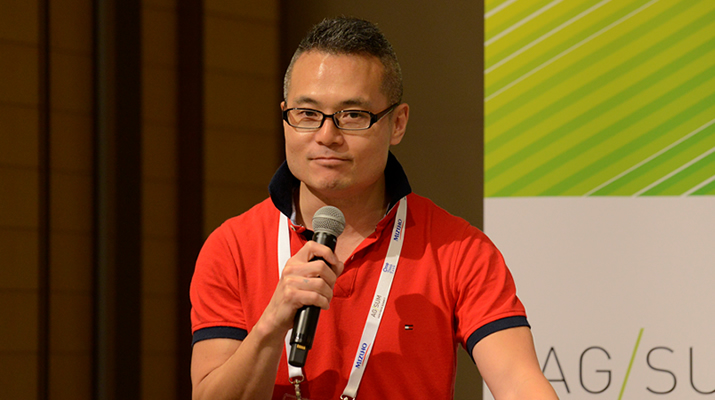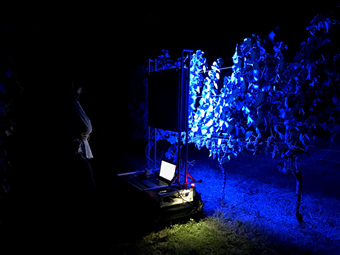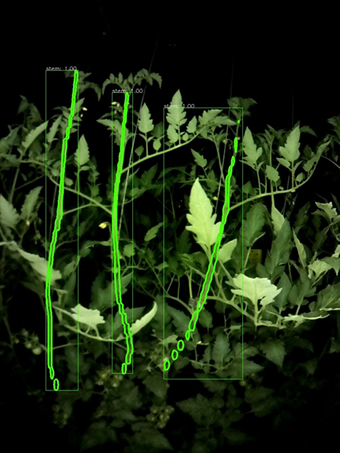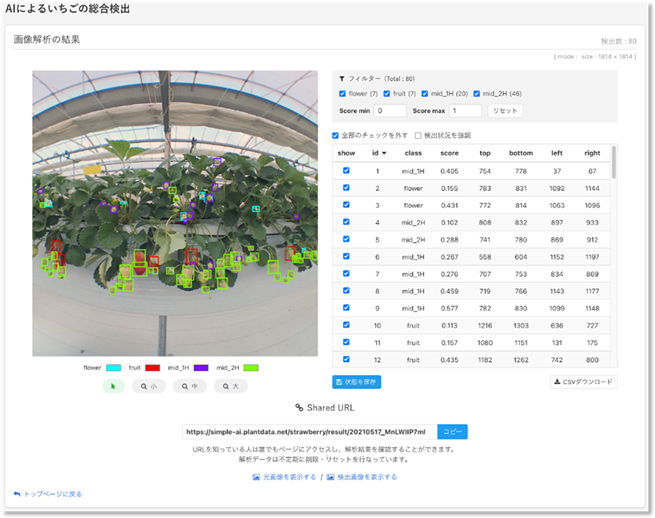
ここからコンテンツです。

Listening to plants' voices the key to establishing data-driven agriculture
Hiroto Kitagawa
In recent years, attention has been drawn to various agricultural issues in Japan, such as the decline in the number of agricultural workers due to the decreasing birthrate, the aging population and the barriers to the entry for new farmers. To overcome these issues, the Japanese Ministry of Agriculture, Forestry and Fisheries announced the Plan for Digital Transformation (DX) in Agriculture in March 2021, revealing their policies to promote digitalization in various areas. Ahead of this, PLANT DATA Co., Ltd. has already begun putting digital technology in place and providing services to measure, analyze, and use biological information about plants. With the goal of establishing data-driven agriculture, Hiroto Kitagawa, the President of PLANT DATA Co., Ltd., talks about the background behind the company's inception and his business vision.
Interviews and report by Akiko Seki
Joining PLANT DATA through a connection from his university

"In general manufacturing and other related industries, the condition of products can be measured using various instruments and understood using the resulting data. In agriculture however, the condition of the products, that is to say plants, has up to now been evaluated only by the human eye and understood subjectively. What PLANT DATA now makes possible is to gather data beyond the level of the human eye by means of image analysis technology and robots. This then allows us to measure and digitize the plants' condition. By utilizing these technologies, the company aims to increase the sophistication of agriculture." said Kitagawa, summarizing PLANT DATA's business.
In order to master the skill of identifying the condition of plants, which do not of course speak, takes years of acquired experience and intuition. For this reason, agriculture is dependent on individuals' expertise, which makes it hard to understand systematically. This can lead to problems in agriculture. Aware of this issue since his student days in the University of Tokyo's Department of Agricultural Engineering, Kitagawa believed that the key to the solution could be to increase the sophistication of agriculture using digital technology.
PLANT DATA is a venture that was established in 2014 by Professor Kotaro Takayama of Ehime University's Graduate School of Agriculture to realize the practical application of his research - namely plant measurement and diagnosis technology. Through the Cross-appointment System, Professor Takayama also became a professor in the Electronics-Inspired Interdisciplinary Research Institute (EIIRIS) of Toyohashi University of Technology (TUT) in 2019. Due to this appointment, while PLANT DATA is headquartered in Ehime University, the company also established an operating base for engineering-related development at TUT. As a result, PLANT DATA is certified as a new venture originating from both Ehime University and TUT.
"Professor Takayama and I were classmates at university. The professor's studies focused on the information field while my research was on the automated control of agricultural machinery and other related subjects. After graduation, I worked in ICT-related companies and other companies for several years. Later, when I was a director and working in management at an agricultural venture, Professor Takayama consulted me about the creation of a start-up. Once I heard his business plan, I could immediately see the potential for PLANT DATA's technologies. Accordingly, in 2015 I became the President and CEO of PLANT DATA, with the goal of making use of my experience in business to help the company grow.
Quantifiable measurement of the plant's photosynthesis
A pillar of PLANT DATA's business is the provision of services that measure biological information about plants and utilize the data to manage cultivation. Kitagawa states that, "The core of our technology is to measure biological information, so in a sense to listen to the voices of plants, and then to visualize their condition."

One of the measuring methods is the measurement of chlorophyll fluorescence. This technique measures the function of the chlorophyll in plants and algae. Chlorophyll acts during photosynthesis: It absorbs light energy and decomposes water, and then generates oxygen, electrons and other components of green tissues. In this process, around 80% of the absorbed energy is used, and the leftover energy is discharged as heat or red light called "chlorophyll fluorescence." Imaging this chlorophyll fluorescence makes it possible to quantifiably evaluate a plant's photosynthetic activity. This image-based measurement uses an "induction phenomenon," a process by which the chlorophyll fluorescence intensity changes over time after a plant in darkness is illuminated with light.
"In the simplest terms, photosynthetic activity reflects the plant's ability to photosynthesize." Even if not immediately apparent, the plant's photosynthetic capabilities may be reduced due to stress from environmental changes or disease. Quantifiably evaluating these factors makes it possible to identify problems early on and take action. The induction method itself was developed many years ago. However, at the time the depth of knowledge was insufficient to use it for measurement. "PLANT DATA is the only company that has successfully commercialized measuring instruments for use on agricultural production sites and utilized the resulting biological plant data," states Kitagawa with confidence.
Collecting and using an array of data on agricultural production sites
Another measuring technique enables the real-time measurement of photosynthesis and transpiration, or "photosynthetic performance." According to this method, plants are sealed in a chamber, and changes in the CO2 concentration due to photosynthesis and the rate that water vapor is released through transpiration are measured every five minutes.
"Even if a plant's ability to photosynthesize is high, it will vary depending on the environmental factors, such the amount of light, the CO2 concentration, and the watering conditions. By analyzing the measured data in combination with the environmental data, we can understand whether sufficient photosynthesis is occurring, or not if we can pinpoint where the problem lies." explains Kitagawa.

In addition to these technologies, PLANT DATA offers an infographic service providing research data on plant growth to help farmers. Agricultural production sites measure an array of information: environmental data including temperature, humidity, and sunlight; labor information about the status of workers' tasks and information about plant biology that PLANT DATA made it possible to collect. However, much of this information is not being collected in the current conditions. Also, there are no platforms used to share the data with on-site devices and systems in many cases.
"To meet this challenge, work is underway to select the necessary data from the variety of information collected by agricultural production sites, with plant biology at its core, to enable analyses using AI and other deep learning technology. I expect that the kind of information based on experience and intuition which normally takes years to develop will be now readily available as quantified data. Disseminating this knowledge will make it easier for new farmers to enter the industry, and for farms to expand. It is hoped that this will contribute to the revitalization and optimization of agriculture."
The agricultural products targeted by PLANT DATA are mainly plants such as tomatoes, cucumbers, eggplants, peppers, and strawberries cultivated in large, advanced greenhouse facilities, called "Netherlands-style farming." Recently, Kitagawa has also been consulted regarding measurements for decorative plants. "The targets can be any plant whose cost and effort to manage makes it worthwhile." he says.
The company set up a subsidiary in the Netherlands, which is a leading agricultural country, and also worked on test measurements in Wageningen University, a world-renowned university in the field of life science. PLANT DATA's quest to establish data-driven agriculture has only just begun.
Mr. Kitagawa's message to people who wish to start their own business
Due to the impact of things such as climate change and the pandemic, society and the environment around businesses are drastically changing. This change can also be a great chance to start new services. While even some large companies are unable to respond to this change, the agile decision making of new ventures may work to their advantage.
Note however that starting a business is a means, not an end. Going forward, I expect human resources with engineering capabilities, like the students of KOSEN (National Institute of Technology) and universities of technology, will be in high demand, so they should carefully consider which path to take to achieve their goals. One advantage of starting a business is that you are in a position to weigh for yourself the balance of accelerating the attainment of your goals against the resulting risks. University-originated new ventures are specifically backed up by technology and science, which is a tremendous advantage for them. I recommend entrepreneurship for those people whose dream is to rapidly make their research achievements useful in society.
植物の声を聴き、データ駆動型農業の実現をめざす
北川 寛人
少子高齢化に伴う農業従事者の減少、新規参入の難しさなど、近年、日本の農業が抱えるさまざまな課題が指摘されている。それらの克服に向けて、農林水産省は2021年3月に「農業DX(デジタルトランスフォーメーション)構想」を発表し、あらゆる領域でデジタル化を進める方針を打ち出した。PLANT DATA株式会社はそうした動きに先駆けて、デジタル技術を駆使した植物生体情報の計測・解析・活用サービスを提供してきた。データ駆動型農業の実現をめざす同社の代表取締役、北川寛人さんに、設立の経緯や事業ビジョンについて聞いた。
学生時代の縁でPLANT DATAに参加
「一般的に製造業などでは生産物の状態をさまざまな機器で計測し、データとして把握します。ところがこれまで農業では、生産物である植物の状態を人間が目で観察して主観的に把握してきました。ここに画像解析技術やロボットを利用し、人間の目で捉えられないものまで可視化して、植物の状態を計測・データ化して活用することで、農業の高度化をめざしています」。北川さんは株式会社PLANT DATA(以下、PLANT DATA)の事業についてそう話す。
物言わぬ植物の状態をつかみ適切なケアを行うためには、経験とそれに裏打ちされた勘が求められる。そのゆえノウハウが属人的になり、形式知化しにくいことが農業の課題となってきた。北川さんは、東京大学農学部農業工学科で学んでいた頃からそうした問題意識を持ち、「課題解決にはデジタル技術を用いた高度化が必要だ」と考えていた。
PLANT DATAは、愛媛大学大学院農学研究科の高山弘太郎教授が、自身の研究成果である植物の計測・診断技術を社会実装するために2014年に設立したベンチャーである。高山教授はクロスアポイントメント制度を利用して2019年より豊橋技術科学大学エレクトロニクス先端融合研究所教授を兼務。それに伴いPLANT DATAも愛媛大学に本社を置きつつ、工学的開発事業拠点を豊橋技術科学大学に設けた。そうしたことから、PLANT DATAは、愛媛大学発ベンチャーと豊橋技術科学大学発ベンチャーの両方に認定されている。
「私と高山は大学の同期で、高山は情報系ですが、私は農機の自動制御などの研究を行っていました。大学卒業後に数年間ICT関連企業などに勤めたのち、農業ベンチャーの取締役などを務めていたところ、高山から事業化に関する相談を受けました。話を聞く中で、PLANT DATAの技術に将来性を感じ、自分が実ビジネスで培ってきた経験が事業拡大に活かせるならばと、2015年にPLANT DATAの代表取締役兼CEOに就きました」。
光合成のスキルを数値計測
PLANT DATAの事業の柱は、植物生体情報の計測と、計測データを栽培管理に活かすためのサービスの提供である。生体情報の計測により、「植物の声を聴き、状態を見える化するのが当社の技術の肝」と北川さんは言う。
その計測方法の一つが、「クロロフィル蛍光計測」である。これは、植物や藻類の組織に含まれるクロロフィル(葉緑素)の機能を測る技術だ。クロロフィルは光合成の一部を担い、光エネルギーを吸収して水を分解し、酸素や電子などを生成する働きをもつ。このとき利用されるのは吸収したエネルギーの約8割で、残りは熱や「クロロフィル蛍光」と呼ばれる赤色の蛍光として捨てられる。このクロロフィル蛍光を画像計測することにより、植物の光合成活性を数値評価できる。画像計測には、暗いところに置かれた植物に光を照射したとき、クロロフィル蛍光強度が経時的に変化する「インダクション現象」を利用する。
「光合成活性とは簡単に言うと『光合成のスキル』です。見た目ではわからなくても、植物は環境変化や病気などのストレスによって光合成の能力を低下させてしまうことがあります。それを数値評価できれば、早めに問題を把握して対処することが可能になります」。インダクション現象そのものは古くから知られているが、これを計測に用いるにはさまざまな知見が必要だった。「農業生産現場で計測できる装置を商品化し、計測データを植物生体情報として活用できるようにしたのは当社だけです」と北川さんは胸を張る。
農業生産現場の多様なデータを取得・活用する
もう一つの計測技術は「光合成蒸散リアルタイム計測」と言って、「光合成のパフォーマンス」を測るものだ。チャンバーで植物を覆い、光合成による二酸化炭素の濃度変化と、蒸散による水蒸気の排出量を5分おきに計測する。
「光合成のスキルが高くても、光量や二酸化炭素濃度、灌水状況など、環境によってパフォーマンスは変化します。この計測データと環境データを併せて分析することで、光合成がうまくできているかどうか、できていなければ問題がどこにあるのかを把握できます」と北川さんは説明する。
PLANT DATAではこのほかに、生育調査データのインフォグラフィック化サービスも提供し、農家のデータ活用を支援している。農業生産の現場には温湿度や日照などの環境情報、人の作業状況を示す労務情報、PLANT DATAが取得可能にした植物生体情報が存在するが、現状ではその多くが取得できていない。また、現場のさまざまなデバイスやシステムのデータを連携するための基盤も存在しない。
「そこで私たちは、植物生体情報を軸として農業生産現場の多種多様なデータから必要なものを選び、AI解析なども併せて利活用できるよう取り組んでいます。経験や勘という暗黙知を数値データで形式知化することで共有できるようになれば、新規就農や農園の大規模化もしやすくなり、農業の活性化や効率化に貢献できるでしょう」
PLANT DATAが主なビジネスターゲットとする農作物は、オランダ型と呼ばれる大規模・先進的なハウス施設で栽培されるトマト、キュウリ、ナス、ピーマン、パプリカ、イチゴなど。最近では観葉植物の計測に関する相談もあるといい、「人間にとってコストをかけて管理する価値のある、あらゆる植物がターゲットになります」と北川さん。
農業先進国オランダに現地法人を設立し、生命科学分野で世界的に知られるワーゲニンゲン大学でのテスト計測も進めた。データ駆動型農業の実現へ、PLANT DATAの挑戦はこれからが本番だ。
(取材・文=関 亜希子)
北川さんから起業を志す皆さんへメッセージ
気候変動やパンデミックなど、ビジネスを取り巻く社会環境は激変しています。この変化は、新しいサービスを立ち上げるには絶好の機会でもあります。大企業といえども変化に対応できずにいる中で、ベンチャーの意思決定の速さは強みになるでしょう。
ただ、起業は目的ではなく手段です。今後、高専生や技科大生のようなエンジニアリング力を持つ人材は売り手市場になるはずですから、自分の目標を達成するためにどの道を選ぶべきか、よく考えることも大切です。起業の利点は、リスクをとる代わりに早く目標に近づけること。特に大学発ベンチャーは技術に学術の裏付けがあることが圧倒的な強みになりますから、研究成果を早く社会に役立てたい人には起業をお勧めします。
Profile

| Name | Hiroto Kitagawa |
|---|---|
| Affiliation | PLANT DATA Co., Ltd. |
| Title | CEO |
| Fields of Business | Business Development/ Agritech/ DX/ IoT/ ICT |
Reporter Profile

Akiko Seki is a freelance writer. She graduated from Department of Applied Biological Science, Faculty of Agriculture at Tokyo University of Agriculture and Technology. She has worked on technical journals for major companies and has served reporting and writing in the field of science and technology.
ここでコンテンツ終わりです。
